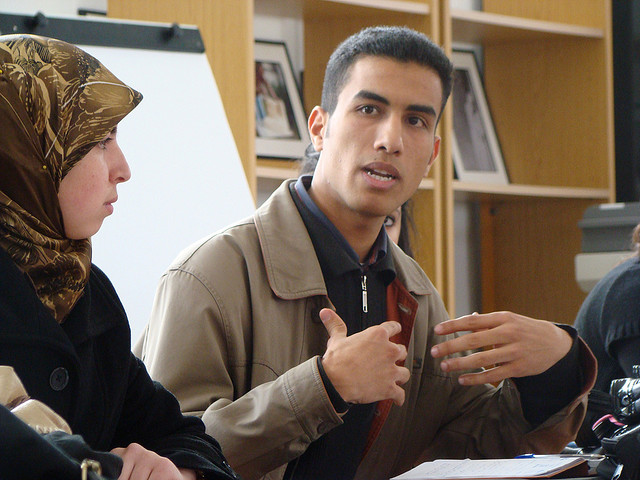Note: this post was originally published on my previous blog on October 1, 2014. It seems particularly timely right now.
Islamophobia is on the rise in America–and, sadly, particularly in the Christian community. It’s whispered in gossipy comments about our President (“you know, he’s a secret Muslim”). It’s present in scary-music You Tube videos that go viral as they attempt to inform us about massive Muslim population growth (some manipulation of facts included). And it was especially present in the reprehensible op-ed piece by Gary Cass, recently published by Charisma News, “I’m Islamophobic, Are You?” Charisma was shamed into taking the post down, but one had to wonder why a mainstream Pentecostal website published it in the first place.
Cass’s piece is still readable on his own website, but I have chosen not to link to it. In his piece, he argues that all Muslims want to kill non-Muslims. He says that there are only three possible solutions to dealing with Muslims in America. First, conversion, but he argues that God hates Muslim Arabs, and although there might be one here or there who come to faith in Christ, “History does not record a mighty move of God in saving masses of Muslims. I believe the scriptures militate against mass Muslim conversions.” Since conversion is out, Cass argues that the next alternative is “D.A.M.N.: Depart All Muslims Now.” But since most people’s beliefs about Muslims are “irrational and stupid,” Cass argues this is not likely to happen. Finally, since he has discarded options one and two, Cass argues, “The only thing that is biblical and that 1400 years of history has shown to work is overwhelming Christian just war and overwhelming self defense.” Then he tells his audience to buy a gun and prepare their family. Finally, he closes his piece with this horrifying language:
We will have to face the harsh truth that Islam has no place in civilized society. Muslims cannot live in a society based on Christian ideals of equality and liberty. They will always seek to harm us.
Now the only question is how many more dead bodies will have to pile up at home and abroad before we crush the vicious seed of Ishmael in Jesus name?
Wow. Just wow. I have heard plenty of veiled Islamophobic beliefs, but this is so blatant and aggressive that I can hardly believe it was published by a mainstream publication. I would not be shocked if some radicalized Christian takes this his post as a mandate to kill and terrorize Muslims here in the U.S.
I want to stand against this kind of hateful, dangerous nonsense which goes completely against the spirit of faithful Christianity and utterly misrepresents the God who we serve. Here are 4 reasons why Christians absolutely must take a stand against both blatant and veiled Islamophobia.
1. Love your neighbor.
No one likes to be characterized by their worst representative. Imagine if all Christians were judged by those who shoot abortion doctors or by the Crusaders or by Fred Phelps. Does the presence of violent so-called Christians mean that Christianity is inherently violent? In the same way, it’s unfair and untrue to argue that “every Mosque in America is conspiring to kill you.”
As Christians, our number one mandate is witness to Christ (more on this below). We absolutely discredit our witness and align ourselves with the forces of evil when we engage in bearing false witness and fear-mongering. Consideration and respect rather than aggression is a witness to Christ. God calls us to love our neighbor. We do this by being willing to see our neighbor as a real human being, not a two-dimensional bogeyman. We do this by being willing to put ourselves in our neighbor’s shoes. What would it be like to be Muslim in a country where lots of people are afraid of you and hate you? Wouldn’t it be terrifying? Hate crimes against Muslims are a real thing, and they’re motivated by ignorance.
What if, instead of proclaiming jihad against Muslims, we got to know them? What if we chose to know them as they really are? What if we dared to let them know that we are their friend, and they have no reason to fear us? Just try to argue from Scripture that that is not a Biblical response to our neighbor in our midst.
2. The blessing of the “other.”
As sinful human beings, we are geared toward fearing the “other.” Someone who is different from us can be frightening.
But, Biblically, we are not called to fear the other, but to realize that we have much blessing to gain from the presence of the “other.” We see in the story of the Good Samaritan, the one who is of a despised class and ethnicity (and religion!) turns out to be the one who blesses one of God’s chosen people. When we dare to love and know people, we so often find out that we become the ones who are blessed.
What surprises might we find if we get to know Muslims? How might we learn from them? How might their friendship enrich our lives?
3. The mission field at our door step.
I’m not arguing that we make our Muslim neighbors a project (I will love them whether they convert to my faith or not), but I do argue unapologetically that God loves Muslims, and Jesus died to save them too. Enough of this nonsense about God hating Arab Muslims. It’s time to remember that we Gentiles were also outside God’s covenant, but as Paul says, “But now in Christ Jesus you who once were far away have been brought near by the blood of Christ” (Ephesians 2:13). God longs to bring every person who is far away from Him near.
It is desperately frustrating to see the self-centered Church of Jesus in America missing an incredible opportunity that God has brought to our doorstep. It used to be that if you wanted to be a missionary, you had to travel to a far-away land. But God has blessed us by bringing the mission field to our doorstep. If we respond by turning inward, resorting to hate and violence, and trying to protect our comfortable little world, I honestly wonder what God will say to us on Judgment Day. I really do. The goal of the Christian faith is not to protect what I have, but to reach out to demonstrate and speak the Good News to our neighbors. We are all missionaries, and God has brought the world to our doorstep. What a blessing!
4. Love your enemies.
Someone will argue, “But what about Muslim extremists? There are certainly some of those hiding in our midst. And those people are dangerous!” Look, I’m a realist. I know there are some people here that want to do us harm. It’s a fringe element, but there are some. But here’s the thing: we do not get a pass to fail to love our neighbor just because our neighbor has declared himself our enemy. We don’t get a pass on loving members of ISIL or AL-Qaeda. Rather than a Satanic call to “crush the vicious seed of Ishmael in Jesus name,” Jesus gave us this call:
“You have heard that it was said, ‘Love your neighbor and hate your enemy.’ But I tell you, love your enemies and pray for those who persecute you, that you may be children of your Father in heaven. He causes his sun to rise on the evil and the good, and sends rain on the righteous and the unrighteous. If you love those who love you, what reward will you get? Are not even the tax collectors doing that? And if you greet only your own people, what are you doing more than others? Do not even pagans do that? Be perfect, therefore, as your heavenly Father is perfect.–Matthew 5:43-48, NIV
Of course, nations must sometimes intervene and engage in just war against those who terrify and destroy the innocent. But our call as Church must not be conflated with some warrior mandate. Our call as Church is to sacrificially love and bear witness.
I hope at least one person reading this post will be willing to reject fear and hatred and turn to their Muslim neighbor with the embrace of God’s love. Let’s reject our self-centered, comfortable American Church and dare to reach out to those who are good and those who are bad. Let’s dare to know them. Let’s give thanks that these precious people who God loves are now in our midst. And let’s show them that we think so.
photo credit: Foreign and Commonwealth Office via photopin cc













